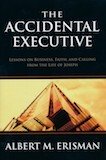The Eulogy Goes Round and Round
Daily Reflection / Produced by The High Calling
Praise be to the God and Father of our Lord Jesus Christ, who has blessed us in the heavenly realms with every spiritual blessing in Christ.
Ephesians 1:
In yesterday's reflection, I explained why it makes sense to describe Ephesians 1:3 as Paul's eulogy. In fact, the Greek text of this verse includes three different words based on the root eulog-, which literally means "good speech." This fact is obscured a bit by the NIV translation, which renders these words as "Praise be to the God and Father of our Lord Jesus Christ, who has blessed us in the heavenly realms with every spiritual blessing in Christ" (1:3). Some English versions prefer "Blessed be" instead of "Praise be," for example the ESV and NRSV, which makes the linguistic parallelism more obvious.
Ephesians 1:3 envisions a eulogy that goes round and round. Yes, we are to offer blessing to God. But our praise is a response to the blessings God has already given to us. In fact, he has "blessed" us with "every spiritual blessing in Christ." In response to what God has done for us, we bless him.
When Paul speaks of God as "blessed," he is certainly calling for words of praise from those who have received God's grace. But our eulogy for God is not only a matter of our speech, as is made clear later in this passage. Indeed, we are to exist for the praise of God's glory (1:12). This includes all that we do in addition to all that we say (see also 2:10). As those who have been blessed by God, we offer our whole lives to him in return.
The fact that God has blessed us "in the heavenly realms with every spiritual blessing" can easily be misunderstood as referring only to post-mortem benefits. Yet, in Ephesians, the "heavenly realms" refers, not to a separate physical space (the skies) or to a place we go after death (heaven), but rather to a reality in which God and Christ are active both now and in the future. When we put our faith in Christ, though we live on earth, we also begin to live now in the "heavenly realms" (see 2:5-6). And, in this life, we begin to experience the "spiritual blessings" of God, that is, good things that come through the mediation of the Holy Spirit. The rest of Ephesians 1:3-14 will spell it out in much greater detail the nature of some of these blessings.
The circle of eulogy does not begin with us, but with God, who blesses us with the gift of life and, through Christ, eternal life. God chooses us, loves us, adopts us as his children, forgives us, reveals his will to us, gives us our purpose for living, and fills us with his Spirit. In light of these blessings and so many more, we respond by blessing God with our words and our deeds, living our whole life for his glory.
QUESTIONS FOR FURTHER REFLECTION: In what ways do you praise God? What helps you to praise him? How might you praise God with your actions in addition to your words?
PRAYER:
Praise to the Lord, the Almighty, the King of creation!
O my soul, praise Him, for He is thy health and salvation!
All ye who hear, now to His temple draw near;
Praise Him in glad adoration.
Praise to the Lord, who over all things so wondrously reigneth,
Shelters thee under His wings, yea, so gently sustaineth!
Hast thou not seen how thy desires ever have been
Granted in what He ordaineth?
Praise to the Lord, who hath fearfully, wondrously, made thee;
Health hath vouchsafed and, when heedlessly falling, hath stayed thee.
What need or grief ever hath failed of relief?
Wings of His mercy did shade thee.
Praise to the Lord, who doth prosper thy work and defend thee;
Surely His goodness and mercy here daily attend thee.
Ponder anew what the Almighty can do,
If with His love He befriend thee.
Praise to the Lord, who, when tempests their warfare are waging,
Who, when the elements madly around thee are raging,
Biddeth them cease, turneth their fury to peace,
Whirlwinds and waters assuaging.
Praise to the Lord, who, when darkness of sin is abounding,
Who, when the godless do triumph, all virtue confounding,
Sheddeth His light, chaseth the horrors of night,
Saints with His mercy surrounding.
Praise to the Lord, O let all that is in me adore Him!
All that hath life and breath, come now with praises before Him.
Let the Amen sound from His people again,
Gladly for aye we adore Him.
Amen.
"Praise to the Lord, the Almighty," by Joachim Neander (1680, translated from German to English by Catherine Winkworth (1863). Public domain.
Images sourced via Creative Commons.






